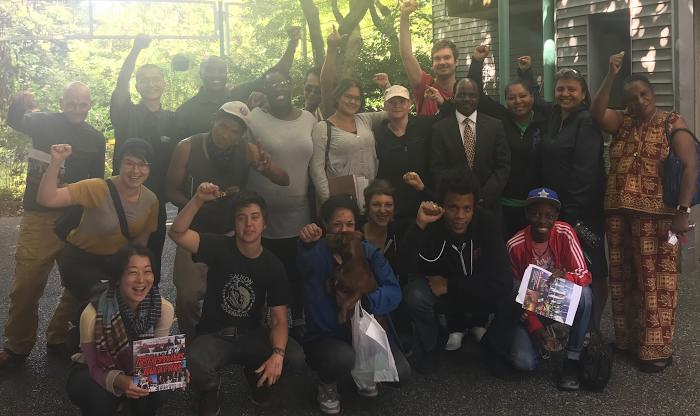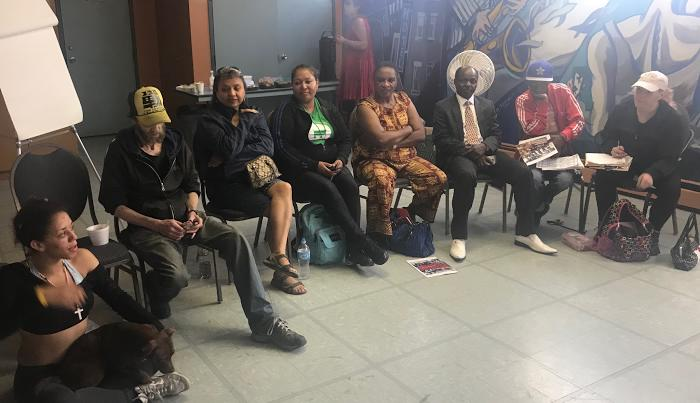

The Anti Police-Terror Project (APTP) is a Black-led, multi-racial, intergenerational coalition based in Oakland that has been working to eradicate police violence in communities of color for over ten years. Three APTP organizers visited the Lower Mainland last weekend. They were hosted by local community organizations, including the Vancouver Area Network of Drug Users, Carnegie African Descent Group, Power of Women and Alliance Against Displacement. During their time here, APTP members participated in a panel discussion at SFU Harbour Centre, a workshop in Surrey, and a second workshop in the Downtown Eastside. Sharing ideas with visiting compatriots from California was invigorating, and the three-day exchange reminded us that our struggles are interconnected.
The RCMP: the biggest gang in Surrey
The City of Surrey is the fastest growing municipality in BC. People of color make up approximately half the overall population, and face profiling and harassment from the police. Surrey is home to the largest RCMP detachment in country, and currently it devotes 30% of its municipal budget to policing. At the first APTP workshop, Lenée Son, a resident of Surrey and an organizer with Alliance Against Displacement (AAD), described the terrain of policing in Surrey, “I see militarized vehicles near my home — tanks, helicopters, heavy equipment and the escalation of police violence. At the same time, the RCMP is in our community centres, parks, schools, and engaging with parents. They are there to subject us to surveillance, but also to encourage us to be their eyes and ears in the community. According to the cops, you’re either a suspect or a snitch.”
In the workshop, James, an APTP organizer argued that we need to insert a critical, anti-policing analysis into public discourse on issues of crime and safety. Dave Diewert, another organizer with AAD made the point that following the gang-related deaths of two youth and one 47-year-old man in this past week, community members and politicians are crying out for more police, claiming that Surrey is underserved. The reality is, in a capitalist system that values profit above all else, poverty is synonymous with crime. Look at the welfare system. People on social assistance make $710 a month. How in the world are you going to make ends meet when, after you pay your rent, you only have twenty dollars in the pocket?
During a break, I asked Asantewaa, one of the three visiting APTP members, how their organization responds to the issue of gang violence. She said, “I think we need to broaden the definition of gang and see that the police are also a gang.” In a way, this speaks to the use of the word ‘gang’ to refer to a threat to society. When low-income Indigenous people and people of color hear that the role of the police is to serve and protect, they often wonder where is the service and protection? Instead they are terrorized by street checks, racial profiling and criminalization.
No dignity from cops: a visit to the Downtown Eastside
Early in the afternoon, before the second workshop, I took our visitors on a quick tour of the Downtown Eastside community. When we reached the corner of Main and Hastings, we saw an arrest taking place across the street. A First Nations woman was handcuffed laying facedown on the sidewalk. We asked what happened and were told that she was causing a ‘security threat’ to passers by. She was being held while the police waited for the ambulance to arrive. We asked why the woman was placed on the pavement in an uncomfortable and humiliating position. Why didn’t they sit her up inside a car, while they waited? VPD officers were very defensive. They told us that she had a medical condition and that they were taking action to reduce the likelihood of her contaminating others.
Our exchange heated up. The police officers were dismissive, clearly not listening to what we were saying, talking over us. “I listened to you quietly as you spoke. You need to be quiet and let me make my point,” said Asantewaa. Wow! One police officer listened but his partner kept running his mouth, missing the valid points we were making about treating people with dignity. Just before we left, the ambulance arrived. The woman was lifted up from the pavement as we left to join our workshop a few blocks down the road.
In the workshop, residents of the DTES talked about the recent complaint that BC Civil Liberties Association (BCCLA) and the Union of BC Indian Chiefs (UBIC) filed against the VPD. According to the BCCLA, “Recent statistics… demonstrate clearly that Indigenous people and black people in the city of Vancouver are being stopped by police at a rate that far exceeds their share of the population.” This came as no surprise to us after what we had witnessed earlier that day.
Community resistance to police domination in Oakland

The work of APTP builds on the legacy of years of the civil rights struggle in the United States. Over the years, people learned to look after each other. In the absence of state-administered social services, community residents began organizing school meals and creating employment opportunities each other. When the state continued to neglect the poor, while prioritizing services to wealthy communities, those who were neglected learned to organize and assert their rights.
In Oakland, APTP organizes in Black, Brown and poor communities. After a police incident, APTP sends a First Responders Team into the community to offer support to those impacted and collect information about the incident. If available, APTP sends a person that reflects the community. Annie Banks, a white member of APTP, explained, “When I first joined the group, I quickly realized that I was not the right person to respond to a community of color following a police incident. I shouldn’t be the one collecting information after a crime scene in a Black or Brown community. I had experience in fundraising and there was a role for me to serve.”
One clear victory that APTP is proud of is the firing of San Francisco Police Chief Greg Suhr over the fatal police shooting of Laquan McDonald, a 27-year-old African American woman. According to news reports, McDonald was suspected of driving a stolen vehicle when her car smashed into a truck. She then fled on foot. Two officers approached her and there was a verbal exchange at which point McDonald was fatally shot by police. The mayor tried to protect the Chief of Police, but the pressure from the community was so was strong that he could no longer resist, and was eventually forced to accept Chief Suhr’s resignation.
Toward a better community vision
We dream of a world where we are empowered to police our own communities and solve problems at the community level, without relying on the state’s law enforcement. We envision a world without prisons or police. We want the government to freeze police budgets and instead, invest resources into the community to fight the root causes of poverty, which lead to gang and other criminal activities. We need to build community power to challenge police violence. To this end, APTP has developed resources that they are willing to share, including a First Responders Training Guide. Police forces across different regions share notes and learn from each other; there is no reason we should not do the same in order to strengthen our movements against police power and build the capacity of people who are marginalized and victimized by the state to fight back.
